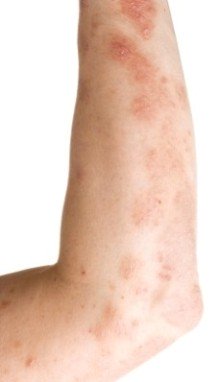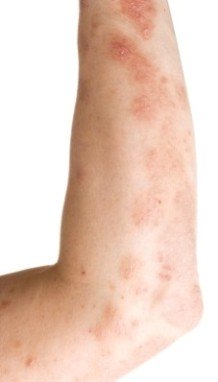This page contains information on what is psoriasis, the types of psoriasis, the psoriasis causes, and treatments. There are many treatments options available, and we discuss which are the most effective.
What is psoriasis is the most common question we are asked. Psoriasis is a chronic, inflammatory disorder of the skin. It is not contagious. It is the result of an abnormally rapid multiplication of the cells of the epidermal layer of the skin. It can affect any area of the body, but is most commonly found on the scalp, elbows, knees, hands, feet, and genitals. More than 4.5 million adults in the United States have it. When you ask what is psoriasis, it is important to remember that there are different types.
Now that we have gone over what is psoriasis, we will discuss the types of psoriasis and the psoriasis cause.
What Are The Types Of Psoriasis?
Plaque – This is the most common form of the disease. 80% of people with psoriasis have this form. It is characterized by raised, inflamed, red lesions covered by a silvery white scale. The skin is very dry, and symptoms include skin pain, itching and cracking. Plaque psoriasis can develop on any part of the body, but most often occurs on the elbows, knees, scalp, and trunk.
Guttate – This form of psoriasis is usually common in children and young adults. This form of psoriasis causes small, red, individual spots on the skin. Guttate lesions usually appear on the trunk and limbs. These spots are not normally as thick or as crusty as lesions of plaque psoriasis.
Inverse – Inverse psoriasis occurs in the armpits and groin, under the breasts, and in other areas where skin flexes or folds. This form of psoriasis appears as smooth, dry areas of skin that are red and inflamed but do not have the scaling associated with plaque psoriasis. Inflamed lesions can be debilitating.
Pustular – This relatively unusual form of psoriasis affects fewer than 5 percent of all people with psoriasis. Pustular psoriasis usually occurs in adults. This psoriasis causes blister-like lesions filled with non-infectious pus and surrounded by reddened skin. Pustular psoriasis, which can be limited to one part of the body (localized) or can be widespread, may be the first symptom of psoriasis or develop in a patient with chronic plaque psoriasis.
Generalized pustular psoriasis is also known as Von Zumbusch pustular psoriasis. Widespread, acutely painful patches of inflamed skin develop suddenly. Pustules appear within a few hours, then dry and peel within two days. This form of the disease often requires hospitalization.
Erythrodermic – This psoriasis causes severe itching, scaling, and pain. The skin becomes a fiery red. Erythrodermic psoriasis disrupts the body’s chemical balance and can cause severe illness. If you have this form of psoriasis you should seek medical care from a doctor immediately.
Now that we have discussed what is psoriasis and what are the types of psoriasis, we will go over the psoriasis causes.
What Are The Psoriasis Causes?

The underlying psoriasis cause is unknown. However, it can be genetically inherited or passed from generation to generation.
Most researchers agree that the immune system is somehow mistakenly triggered, which speeds up the growth cycle of skin cells. A normal skin cell matures and falls off the body’s surface in 28 to 30 days. But a psoriatic skin cell takes only three to four days to mature and move to the surface. Instead of falling off (shedding), the cells pile up and form the lesions. Possible triggers include: stress, injury, illness, infection, steroids, and reaction to medications. Psoriasis is not an infection and it is not contagious.
Now that we have gone over what is psoriasis and the psoriasis causes, we will discuss how serious psoriasis is.
How Serious Is Psoriasis?
Psoriasis is measured in terms of its physical and emotional impact. Physically, if less then 2 percent of the body is involved, the case is considered mild. Between 3 and 10 percent is considered moderate, and more than 10 percent is severe. (The palm of one hand equals 1 percent.)
Psoriasis also is measured by its impact on quality of life. When psoriasis involves the hands and feet, it may also be considered severe because of how it affects a person’s ability to function. Or, if a person’s psychological or emotional well-being is considerably affected, the psoriasis may also be considered severe.
Now that you know what is psoriasis and the psoriasis cause, we will discuss treating it.
Is There A Cure?
Conventional medicines only treat the symptoms of psoriasis. They do not address the fundamental cause. This only provides temporary relief.
There are many in the health care field that believe psoriasis is curable by using the right natural treatments. They believe that treating psoriasis from the inside and from the outside can reduce or cure it. Topical treatments from the outside will relieve symptoms and provide temporary relief. Treatment from the inside will help build up your immune system, and reduce or eliminate future outbreaks.
We have been recommending a product for several years now to help strengthen your immune system. It contains only safe and natural ingredients, and the results have been remarkable. For treating psoriasis, we believe it is absolutely essential. That product is the Zenmed Skin Support Supplement. Follow this link to learn more about it, and how it can help you.
For the topical treatment of psoriasis, we have found an extremely effective product. It also contains only safe and natural ingredients, and we believe it is the best psoriasis product on the market. That product is Thena Healing Cream. We highly recommend you follow this link to learn more about it, and how it can help you.
We have seen even the worst cases of psoriasis eliminated. You just need to start your psoriasis treatment immediately, and use the right safe natural treatments.
If you have any questions about what is psoriasis, the psoriasis causes, or any specific psoriasis cause, please contact us.
Additional reading:
Psoriasis treatment – Which treatments work best and why. See the best ways to eliminate your psoriasis.
Dead Sea salt psoriasis treatments – Learn why are Dead Sea salt products especially effective for psoriasis. What is psoriasis and dead sea salt cream?
Psoriasis scalp treatment and shampoo – Discover which shampoo’s help your scalp problem.
Natural treatment options – Learn about natural treatment options. Which work the best and offer the fastest relief. See if they can eliminate your psoriasis cause.
Symptoms of psoriasis – Additional detailed information about the psoriasis symptoms. Included is detailed information on the types of psoriasis, and the symptoms for each type.
Psoriasis causes – Detailed information about what causes psoriasis. Includes an extensive list of potential triggers.
Psoriasis photos – Extensive database of psoriasis pictures. Includes pictures of psoriasis on all parts of the body.
Psoriasis medicine – Learn about the different prescription and non prescription treatments for psoriasis. List of benefits and side effects for each.
If you still have questions about what is psoriasis, the following sections will help. First, we provide additional detailed information on specific medications for psoriasis. They include the benefits of salicylic acid, the cyclosporine side effects, dovonex ointment information, the humira side effects, the remicade side effects, the methotrexate serious side effects, and descriptions of enbrel prescription drug and raptiva. We will update this page often with information on additional medications for psorasis on a regular basis. If you are looking for free home remedies psorasis, or more information on natural cures for psorasis, be sure to follow the links. We also have recently added pages on psorasis of the scalp and new psorasis treatments. Please be sure to take a look at them, as well as our general treatment for psorasis page. It is loaded with information, facts, and links to information about psorisis treatment. Please check back often for updates to our what is psoriasis page!
Recently we have received requests for additional information on some psoriasis medications. Follow these links to read about tar cream psorasis and does tazorac work. Finally if you have any additional questions about psoraisis treatments, or the psoriasis cause, please contact us. We will try our best to answer all questions about psorasis.
More than What Is Psoriasis on our Healthy Skin Guide Home Page
